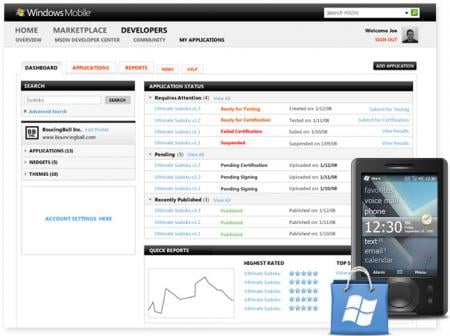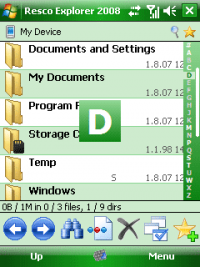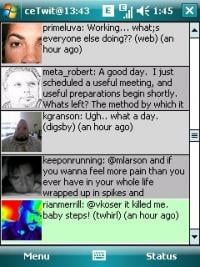Developers weigh in on Marketplace plans

All the latest news, reviews, and guides for Windows and Xbox diehards.
You are now subscribed
Your newsletter sign-up was successful
We've been digesting the news surrounding Microsoft's Windows Marketplace for Mobile as the details trickle out. Developers keep 70 percent of the profits, same with Apple's App Store. Standards must be met, but Microsoft will be there to guide developers.
And recently there's been a bit of debate as we learned that updates to an application count the same as submitting a new app. [I Started Something via jkontherun]
Here's how it works: For the initial $99 application fee, devs can submit up to five apps. Any additional submission beyond the first five will cost another $99. So you could submit one application, then update it four times in a year without paying more. Or you can submit five different apps. Dealer's choice. Counting app updates against the 5-a-year free limit sounds downright crazy wrong to us, but we're not developers.
So before we get all outraged, let's take a deep breath and think things through. More to the point, we asked developers. After the break, we talk with a few well-known developers and see how they feel about Marketplace.
Probably the biggest difference between Microsoft's Marketplace and Apple's App Store is that, initially, writing programs for the iPhone was brand new. Everyone starts from zero, and at the same time. Apple runs the ship and has everything on lockdown. If you want to (officially) release an app for the iPhone, you do it on Apple's terms.
Obviously, developers have been writing and releasing applications for Windows Mobile for quite some time now. Sure, you follow the parameters of the Software Development Kit (SDK) in the actual programming. But distributing the app has been entirely up to the developer. Some have their own Web sites from which they give away their app for free. Others are purchased from sites such as Handango or Mobihand (which we use for the WMExperts Software Store).
Product visibility
If you're a Windows Mobile smartphone user for, say, longer than 2 weeks, chances are you've tried something from SPB Software House. They make Mobile Shell, one of our favorites, business, weather and productivity apps ... you name it.
All the latest news, reviews, and guides for Windows and Xbox diehards.
So you might think that a popular and well-established software company, which already has a strong outlet for its products through Handango, might not want or need Windows Marketplace.

Not so, said Victoria Krasilshikova, the corporate communications manager for SPB. Having the full might of Microsoft behind a product would be an advantage.
"We are very excited to see [Marketplace] go live," she wrote by e-mail. "The reasons are clear – still a relatively small percentage of smartphone owners (including Windows phone owners) actually purchase software for their handsets, the reason being the complexity of the process itself, the uncertainty of success — will the ... paid-for application actually launch on your phone?
"There are problems with credibility for all developers, even SPB. And still even today, most users don’t even suspect that their phones can do more and can perform better. So, we really hope that the [Marketplace] will combat this problem."
Another major developer, Resco Mobile Solutions, also plans to hop on board the Marketplace from the beginning.

Writes Resco's Marcel Saffa: "I think Windows Mobile Marketplace is a good idea. Resco really appreciates Microsoft's step. Such a system surely will shorten the way in which a user can download and buy applications.
"We plan to update all our applications as soon as we're able."
So if you're selling something, product visibility is key. If more people who know about your app, then more people will buy it. Makes sense. But what about free apps? Take a look at your phone. Of all the programs you use, how many did you pay for? OK, how many paid apps did you pay for? The Windows Mobile developer community is as strong as any, and stronger than most, we'd argue.
Upside to the Update situation: Separating the wheat from the chaff
Putting a monetary ceiling over developers might seem at face value like a quick money grab by Microsoft, but there are advantages to doing it. What comes to mind first is this: If developers have to pay to have their app in the Marketplace, they'll take more time and develop better applications.

Vince Koser is the author of the popular Windows Mobile Twitter client ceTwit, which he distributes free from his blog, Kosertech.com. More often than not, you'll see smaller, more independent developers release updates more frequently. So does the $99 for five apps (or updates) bother him?
"I think the 5 application submissions a year is realistic," Koser writes. "I think it
will cut down somewhat on the "2-hours-to-develop, try-to-turn-a-quick-buck type applications that we are seeing in the iPhone AppStore, which isn't a bad thing.
"On the down side, it might deter someone from making an application they wanted to give away free that might be really good if they have already released 5 items for the year."
Marketplace for life?
It's easy to get all up in arms these days whenever a company seems to be (gasp!) trying to make money. But as we mentioned from the outset, there's a very strong developer community surrounding Windows Mobile that has been putting out quality applications for year, and many of them for free. And that isn't likely to disappear with the advent of the Marketplace.
"I think that we need to realize that the distribution model as I understand it isn't going to prevent me from continuing to distribute my application as I do now," ceTwit's Koser said. "So if I want to release some free software, I think I will still have the option to just put it up on the web as I do now."
What should be interesting to see is how Microsoft might handle a sort of symbiotic relationship with developers outside the Marketplace. Could a dev sell an application in the Marketplace, and then release updates for free on his or her own Web site? In-app updates are already available (though for the most part under-used), so that might be an option.
Regardless, Microsoft's going to need to clarify its position on the difference between submitting an application and issuing updates, or things might get ugly. Or they might not. Resco's Saffa is optimistic that Microsoft will revisit the issue before the Marketplace launches later this year.
"This is not positive message for us, but I believe that Microsoft will re-evaluate this strategy."
Update: BirdSoft, makers of excellent WinMo goodness like Extreme Agenda, chimes in in the comments below.

Phil is the father of two beautiful girls and is the Dad behind Modern Dad. Before that he spent seven years at the helm of Android Central. Before that he spent a decade in a newsroom of a two-time Pulitzer Prize-finalist newspaper. Before that — well, we don't talk much about those days. Subscribe to the Modern Dad newsletter!
